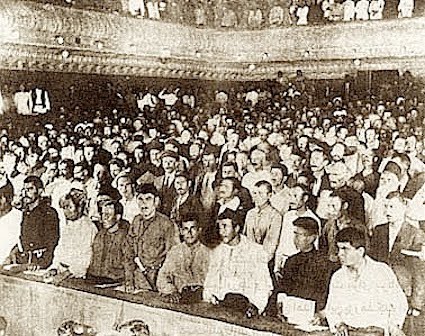
The Central Asian Holocaust of the First World War, when Tsarist imperialism massacred at least 500,000 Khirgiz Tartars in 1916 is little known today but forms part of the twentieth century Koroglu of the Turkic Peoples. It took place in the midst of the First Imperialist War of 1914-18 when Russian imperialism was facing a major crisis in its war against German imperialism.
The massacre was mentioned in the Manchester Guardian of 28 November 1917: ‘While Western Europe has heard about Armenian massacres, the massacre of the Central Asian Moslems by the Tsar’s agents has been studiously hidden.’
Under Tsarist Imperial rule, Turkestan was converted to a major cotton-growing region to compensate for the loss of the US cotton supply in the 1860s due to the American Civil War. The resulting economic development brought some small-scale industry to the region, but the Turkic peoples were worse off than their Russian counterparts, and many farmers became indebted.
Cotton price fixing after the start of the Imperialist War in 1914 made matters worse, a large, landless rural proletariat soon developed, gambling and alcoholism became commonplace, and the crime rate rose. Historian Togan wrote ‘after the proliferation of cotton planting in Ferghana (imposed by the Tsarist Imperial state at the expense of cereal cultivation) the economic conditions deteriorated’.
On 25 June 1916, a Tsarist Imperial Decree ordered the compulsory conscription to military service of Muslims in Central Asia. This signalled the beginning of the national liberation movement which was documented by historian and participant Zeki Velidi Togan.
Imperialism means as communists we support the right of self-determination of nations. The Turkic peoples were an oppressed nation fighting an oppressor state in Imperial Russia. Self-determination is an essential element in the solution of the national question. The Russian imperialist state comprised nationalities such as the Turkic peoples deprived of rights, and suffering acute deprivations. Lenin identified ‘the intensification of national oppression under imperialism.’
In July 1916, the first mass protest meeting took place in Tashkent and Tsarist Imperial police fired into the crowd. Arrests and summary executions followed. The Russian settlers, who had been brought into Tashkent some thirty to forty years earlier, began looting at the instigation of the Imperial police. Protest meetings spread all over Central Asia, and railroads were destroyed.
The Imperial Russian state declared martial law, and armed the Russian settlers in Central Asia to act as imperialist death squads to reinforce the Imperial army. Imperial generals moved all their forces against Jizzakh. Imperial regiments attacked the people of Khiva region, and according to eyewitnesses, massacred babies in the cradle. Those who were not killed were stripped of their all possessions. Contemporary reports estimated that between 25 June 1916 and October 1917, some 1.5 million Turkic peoples were killed by the Tsarist Imperial forces. At least half of the Central Asian livestock was destroyed, and personal property was looted by the Imperial military forces. In the midst of imperialist wars, the extermination of peoples occurs.
Following the Bolshevik revolution in Russia in October 1917, a Congress of the Peoples of the East was held by the Communist International in Baku in September 1920. 2,000 delegates attended including anti-imperialist and Bolshevik fighters from the Tajik, Kirghizes, Uzbek and Turkmen peoples. The Baku Congress committed to a struggle of oppressed peoples against the imperialist oppressors.
Regional autonomy is an essential element in the solution of the national question. Turkic peoples joined the Communist Party of the Soviet Union under Lenin and Stalin’s indigenisation policy and established the Uzbek, Tajik, Krgyz and Turkmen Soviet Socialist Republics.




